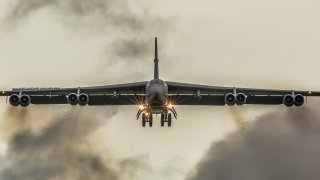Could the U.S. Air Force Have Bombed Its Way to Victory in Vietnam?
Airpower alone wasn’t the sole contributor to the near-triumph of the anticommunist forces in Vietnam, but it was the biggest factor in America’s near-victory.
Hard to believe as it may seem, this past April marked the fiftieth anniversary of the end of the Vietnam War, and it was a tragic ending, as it resulted in a Communist victory and, among other things, the mass murder of 2.5 million innocent South Vietnamese, particularly those of Han Chinese descent and/or those comprising Vietnam’s entrepreneurial class.
That said, contrary to the assertions of anti-American pundits in academia and the media, the United States actually nearly won the Vietnam War.
The Mission
Without a doubt, U.S. airpower was the biggest factor in America’s near-victory in Vietnam, as most devastatingly demonstrated during Operation Linebacker II—the so-called “Christmas bombing” of Hanoi that utterly devastated strategic targets in North Vietnam. As noted by Mark W. Woodruff in his excellent 1999 book Unheralded Victory: The Defeat of the Viet Cong and the North Vietnamese Army 1961-1973:
“Its antiaircraft system shattered, North Vietnam now lay defenseless to the American bombers, but the United States stopped the attack because there was nothing left worth attacking. Later, accounts began to surface from those with relatives in North Vietnam, who told them that ‘They were preparing white flags to surrender’ because they were convinced they were losing the war badly.”
But Wait, There’s More
That said, airpower alone wasn’t the sole contributor to the near-triumph of the anticommunist forces in Vietnam. Since then-U.S. President Richard Nixon’s policy of Vietnamization was well underway, it means that the ground troops of the Army of Republic of Vietnam (ARVN) would’ve had to do their part—and as much as the ARVN’s fighting ability is generally derided by historians, they still took a step in the right direction by doing their part in the defeat of North Vietnam’s spring 1972 offensive (as noted by Henry Kissinger in his 1994 bestseller “Diplomacy).
There was also the contribution of naval gunfire in putting the heat (both literally and figuratively) upon the North Vietnamese. For more insight into this, read Harrison Kass’ The National Interest article titled “Intense Bombardment’: 1 Iowa-Class Battleship Fired 5,000 16-Inch Shells During Vietnam War.”
To draw some post-Vietnam examples, even in America’s biggest airpower triumphs—from the 1991 Persian Gulf War, known as Desert Storm, to Operation Allied Force (the 1999 Kosovo campaign) and Operation Inherent Resolve (the 2015-2021 anti-ISIS campaign in Iraq)—the United States Air Force (and the U.S. Navy and U.S. Marine Corps aviation components) contributed the lion’s share, but still not all of it. In the case of Desert Storm, ground troops—infantry and armor alike—of the United States and its coalition allies did their part, and in the latter two examples, the Kosovo Liberation Army and the post-Saddam Iraqi Army had a little something to do with it.
What Might’ve Been?
I’m going to wrap up this article by saying essentially the same thing I just said in a separate article draft on Operation Linebacker II:
Maybe, just maybe, if the momentum from Operation Linebacker II and the resultant peace talks had been properly seized upon, and America was allowed to win, then the Republic of Vietnam wouldn’t have fallen under the tyranny of the Communist jackboot, and perhaps a hypothetical present-day South Vietnam would’ve been analogous to the present-day Republic of Korea, a thriving free market democracy that makes its impoverished communist neighbor on the northern side of the demilitarized zone look like a sick joke by comparison.
And maybe, just maybe, if the momentum from Operation Linebacker II and the resultant peace talks had been properly seized upon, the U.S. military wouldn’t have suffered a humiliating defeat and the resultant loss of morale and reputation, which did not recover until the George H.W. Bush administration with the aforementioned Gulf War.
About the Author: Christian D. Orr, Defense Expert
Christian D. Orr is a Senior Defense Editor for National Security Journal (NSJ). He is a former Air Force Security Forces officer, Federal law enforcement officer, and private military contractor (with assignments worked in Iraq, the United Arab Emirates, Kosovo, Japan, Germany, and the Pentagon). Chris holds a B.A. in International Relations from the University of Southern California (USC) and an M.A. in Intelligence Studies (concentration in Terrorism Studies) from American Military University (AMU). He has also been published in The Daily Torch , The Journal of Intelligence and Cyber Security, and Simple Flying. Last but not least, he is a Companion of the Order of the Naval Order of the United States (NOUS)


